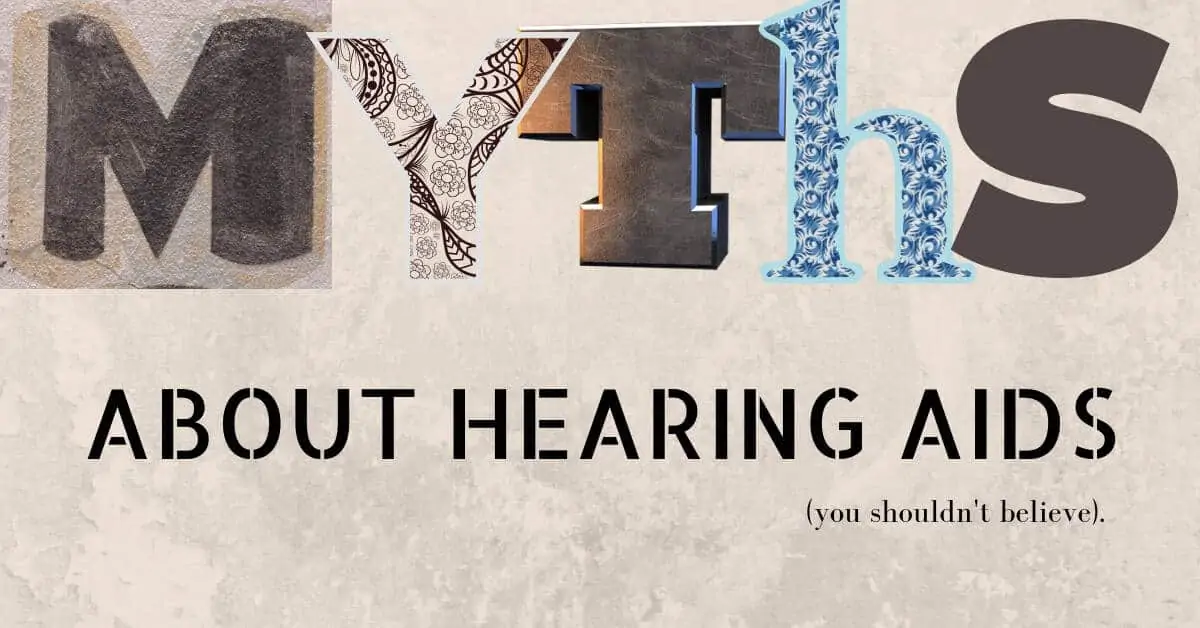At the root, hearing aids are simply another piece of modern, advanced technology that exists to help people better navigate and enjoy their lives. However, there seems to be a shroud of unnecessary mystery and mystique around hearing aids. This is very different from other technology, such as tablets, smartphones, or Bluetooth. The following myths are as common as they are untrue. You may have heard some of the following, however, please do not believe them!
Myth #1: Hearing aids are only for old people, and they will make me look “old”.
With the rise of noisy activities and constant access to streaming music through listening devices, people of all ages are experiencing hearing loss. In fact, about two-thirds of people who notice a hearing loss are under the age of 64. The World Health Organization estimates that about 1.1 billion young people and teenagers are at risk of hearing loss. It is also true that scientific research has shown that those who choose to treat their hearing loss with hearing aids are actually seen as more confident, capable, and able than those who leave their hearing loss untreated.
Myth #2: Hearing aids are eyesores.
We no longer use the brick cell phones of the early 90s that were weighing in at 3 pounds and were known for having a battery life of 30 minutes. Similarly, we also no longer use the gigantic, beige, analog hearing aids of yesteryear. Today’s hearing aids are tiny but mighty. They have incredible technology all housed in extremely small packages. Most of today’s modern hearing aids are extremely sleek and very discreet. Some hearing aids are so small, they sit entirely in the ear canal and are therefore 100% invisible.
Myth #3: Hearing aids will make everything around me sound too loud.
Unlike noise amplification devices, today’s hearing aids are full of smart technology. This means they are able to recognize, categorize, and amplify or muffle different sounds depending on your needs. Modern hearing aids can instantly determine if noises are unwanted or background sounds and will not amplify (and in some cases will even lessen these sounds), all the while amplifying whatever it is that you do want to hear, such as speech or the birds chirping.
Myth #4: I don’t need hearing aids because my hearing isn’t that bad.
Hearing aids are helpful to almost everyone with a hearing loss, from very mild to severe. Most of the time hearing loss is progressive. So, treating hearing loss as soon as you notice it can help slow the progression and worsening of the hearing loss. There is a link between Hearing loss without treatment and a risk increase for developing cognitive decline and dementia such as Alzheimer’s. For this reason, there is an additional health benefit to treating hearing loss early. This proceeds far beyond the health of your ears.
Myth #5: Hearing aid specialists and audiologists are pushy salespeople.
Hearing care is health care. Hearing aid specialists do what they do to help make a positive impact on your health and wellbeing. Spend some time researching hearing healthcare specialists in your area. Maybe even, schedule a few consultations to make sure you feel comfortable and confident with your hearing healthcare provider. Often, these relationships end up lasting years. It is important that you feel your healthcare provider is investing in you.
Myth #6: Hearing aids are too expensive.
Unfortunately, hearing aids can have a hefty price tag. However, there are many options to help offset that cost. The Hearing Loss Association of America (HLAA) lists many nation-wide programs that can help folks with affording hearing aids (https://www.hearingloss.org/hearing-help/financial-assistance/).
Price is a very important factor to consider. It is also important to understand how leaving a hearing loss without treatment can negatively affect one?s finances. It is estimated that the average income for households where one of the income earners has untreated hearing loss is 5-figures lower than the average household where hearing is either treated or there is no hearing loss.
Visit Us at Hearing Group
If you have questions about these or any other myths you may have heard about hearing loss, feel free to reach out to our friendly team at Hearing Group today. We look forward to the opportunity to answer all of your questions. We are happy to walk with you on your journey to improved hearing.

